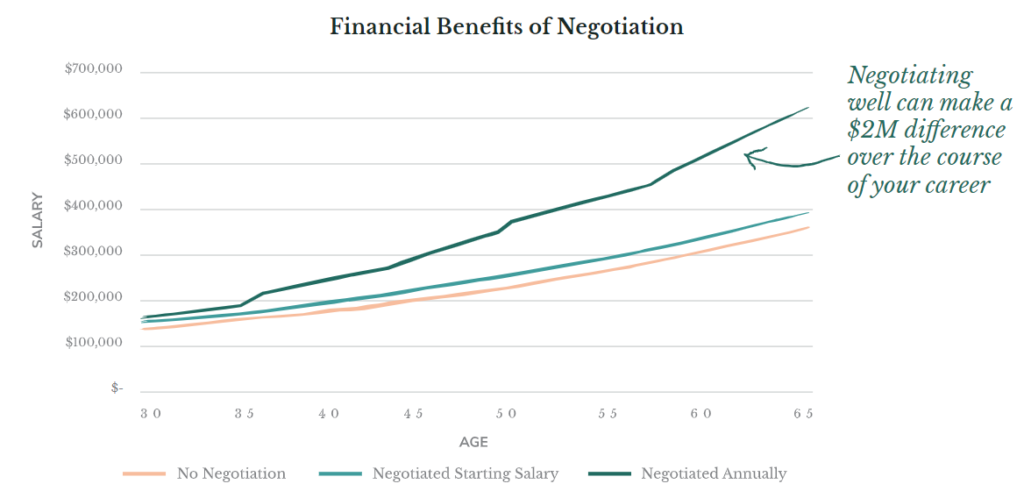Before you take time to learn how to negotiate, it’s worth stepping back and asking “Is this worth it?”
I think there are a million reasons why the answer is yes, but let’s look at just three – the financial benefits, strengthening your relationships, and positioning yourself for future success.
First, there is an enormous financial benefit to negotiating. If you negotiate just an extra 1.5% salary increase annually, that means earning an extra $2M over a 30-year career. Switching roles provides a HUGE opportunity to capture value, as research shows high-performing women who negotiate job offers increase their salary by an average of 7.4%(1). And that’s the average! I’ve been able to negotiate an 11% increase at the same job, a 33% increase at the same company, and double my salary when switching jobs – twice! You can too. The only special thing about me is that I took the time to learn how to negotiate as a woman.
Here are some examples of what the financial benefits can look like:
• A 25 year-old making $100,000 is given a new job offer and negotiates, driving her salary up 7%. She then gets the average annual bump on this new, higher base. At 65, she will retire with $500,00 more – from negotiating ONCE and achieving the AVERAGE return.
• A 30 year-old making $120,000 gets a job offer, decides to invest time in learning how to negotiate effectively, and achieves a 10% pay increase by knowing how to navigate the new salary history inquiry ban. Because of this decision, she will retire with $800,000 more – from negotiating ONCE.
• A 35 year-old making $150,000 decides to switch jobs. She negotiates a 7% pay raise, and then decides to negotiate about once every four years. She will retire with an extra $2M – by achieving the AVERAGE returns.
These scenarios aren’t unusual. In fact, our clients often achieve 20 to 30% pay increases. Many decide they will negotiate annually because once they learn our approach, negotiating becomes an easy way to increase their compensation.

Second, negotiating gives you an opportunity to strengthen your relationship. Are you wondering if I just said that right? When most women picture a negotiation, they picture an aggressive, my-way-or- the-highway argument. That is the not the approach I use or teach. My approach is called collaborative negotiating, and it often improves relationship.
How is this possible? How could you negotiate and end up with a stronger relationship? By listening. Listening is the hallmark of collaborative negotiating. Uncover where your counterpart is coming from. Understand their needs. Ask questions. Dig deeper.
Great negotiators don’t just listen to what their counterpart is asking for but identify the interest behind the ask. Women have an advantage here, as females are more likely to view the world in collaborative terms than men. This enables you to find the wins. When a boss watches you take what she expects to be a win/lose and turn it into a win/win, her confidence in you skyrockets, and your relationship gets stronger.
The third reason to negotiate is that it positions you for future success. How? You won’t just negotiate typical things like salary, but you’ll also negotiate things that help you do your job better – project selection, executive education, administrative support, larger budget, more staff, performance bonus, etc. This will create a virtuous cycle where you are working on assignments better suited to your interests or skills, then tackling those with better support and less stress. Guess what that enables you to do? Accomplish more! And when you accomplish more, you become even more successful at the negotiating table. This is the virtuous cycle we can help you create.
Again, there are a million more reasons to negotiate, but I’m told I shouldn’t go on for too long….
Source: 1 Babcock, Linda and Laschever, Sara. (2007). Women Don’t Ask: The High Cost of Avoiding Negotiation and Positive Strategies for Change. New York: Bantam Dell.

[…] together (I certainly went through that phase), but that also means that you are walking away from significant benefits. Rather, I would suggest learning negotiation best practices that confer additional benefits on […]